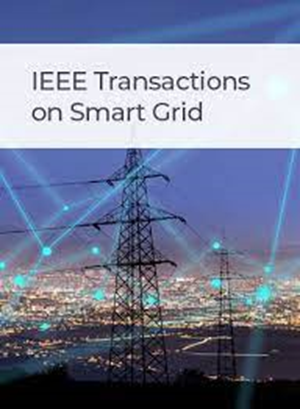P2P Trade With Prosumers’ Actual Approximate Utility Functions Within Near-Potential Games Framework
IF 8.6
1区 工程技术
Q1 ENGINEERING, ELECTRICAL & ELECTRONIC
引用次数: 0
Abstract
There is a potential conflict between P2P trade and distribution network operator (DSO) decisions, which slows down the expansion of P2P trade. Expanding the P2P trade requires reducing this conflict and increasing DSO awareness of the actual behavior of prosumers. In other words, mitigating this conflict requires that DSO approximates prosumers’ utility functions (PUFs) based on their actual behavior. On the other hand, PUFs approximated based on the actual behavior of prosumers have various parameters such as freedom in decision-making, collective influence, privacy, and marginal cost/utility. This is a mathematical challenge for DSO because this class of PUFs may not be convex or continuously differentiable. Hence, in this paper, a near-potential game (NPG) framework is proposed to support the design of P2P trade with PUFs belonging to this class. Also, to develop a realistic model of P2P trade, we classify prosumers into residential and non-residential classes and assume that prosumers have limited information about each other’s decisions. Then within an NPG framework, we introduce a learning model, whereby each prosumer obtains an estimate of the prosumers’ decisions in P2P trade.在近似潜在博弈框架内,利用消费者实际近似效用函数进行 P2P 交易
P2P 交易与配电网络运营商 (DSO) 的决策之间存在潜在冲突,从而减缓了 P2P 交易的扩展。要扩大 P2P 交易,就必须减少这种冲突,提高配电网运营商对消费者实际行为的认识。换句话说,要减少这种冲突,运营服务商就必须根据消费者的实际行为逼近他们的效用函数(PUF)。另一方面,根据消费者实际行为逼近的效用函数具有各种参数,如决策自由度、集体影响力、隐私和边际成本/效用。这对 DSO 来说是一个数学挑战,因为这类 PUF 可能不是凸的或连续可微的。因此,本文提出了一个近似潜在博弈(NPG)框架,以支持设计具有该类 PUF 的 P2P 交易。同时,为了建立一个切合实际的 P2P 贸易模型,我们将消费商分为住宅类和非住宅类,并假设消费商对彼此的决策信息有限。然后,在 NPG 框架内,我们引入了一个学习模型,即每个 prosumer 在 P2P 交易中获得对 prosumers 决策的估计。
本文章由计算机程序翻译,如有差异,请以英文原文为准。
求助全文
约1分钟内获得全文
求助全文
来源期刊

IEEE Transactions on Smart Grid
ENGINEERING, ELECTRICAL & ELECTRONIC-
CiteScore
22.10
自引率
9.40%
发文量
526
审稿时长
6 months
期刊介绍:
The IEEE Transactions on Smart Grid is a multidisciplinary journal that focuses on research and development in the field of smart grid technology. It covers various aspects of the smart grid, including energy networks, prosumers (consumers who also produce energy), electric transportation, distributed energy resources, and communications. The journal also addresses the integration of microgrids and active distribution networks with transmission systems. It publishes original research on smart grid theories and principles, including technologies and systems for demand response, Advance Metering Infrastructure, cyber-physical systems, multi-energy systems, transactive energy, data analytics, and electric vehicle integration. Additionally, the journal considers surveys of existing work on the smart grid that propose new perspectives on the history and future of intelligent and active grids.
 求助内容:
求助内容: 应助结果提醒方式:
应助结果提醒方式:


